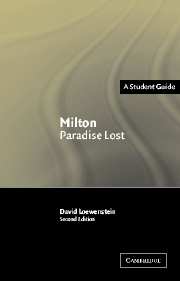2 - Interpreting Paradise Lost
Published online by Cambridge University Press: 05 June 2012
Summary
“Say first what cause”: Paradise Lost and beginnings
After its opening invocation, Paradise Lost launches into its first bold question, which begins the vast narrative of Milton's poem:
Say first, for Heav'n hides nothing from thy view
Nor the deep Tract of Hell, say first what cause
Mov'd our Grand Parents in that happy State,
Favor'd of Heav'n so highly, to fall off
From thir Creator, and transgress his Will
For one restraint, Lords of the World besides?
(1.27–32)This passage, which announces some of the key themes of Milton's sacred poem – the transgression of our original parents, their fall from their happy state, the omniscience of Milton's God – concerns itself with “first” things, including “Man's First Disobedience” (1.1). The word “first” significantly occurs six times in the poem's opening thirty-three lines. Paradise Lost thus immediately announces itself as a sacred poem about origins and beginnings – a poem that bases its great story on the Bible, the first of all texts for Protestants, and specifically on Genesis (especially chapters 1–3), itself the book of origins and beginnings. Indeed, Milton's first invocation explicitly echoes the first words of Genesis – “In the Beginning …” (1.9). And yet this is a poem about origins that will go beyond its Biblical source to inquire about causes, an impulse that even our original father will manifest in Milton's story (see 7.90ff.).
- Type
- Chapter
- Information
- Milton: Paradise Lost , pp. 29 - 121Publisher: Cambridge University PressPrint publication year: 2003

